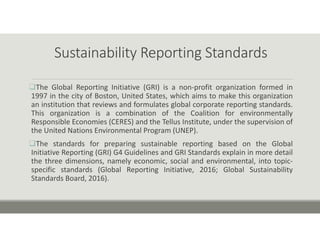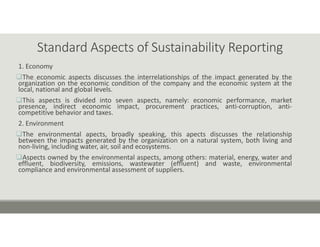Sustainability Report.pdf
- 1. SUSTAINABILITY REPORTING Dr. RIDA PRIHATNI., SE,M.SI,AK,CA,CMA Dr. RIDA PRIHATNI, SE, M.SI, AK,CA,CMA
- 2. Definition of Sustainability Report Sustainability reports are disclosures about the economic, environmental, and social impacts caused by an organization's operating activities that are reported to be integrated with corporate reporting. Sustainability reports reveal the relationship between strategy and organizational commitment to environmental, social, and economic sustainability globally (Sweeney, 2013). The main focus in the presentation of a sustainability report is on the way the business is run, with greater attention being paid to how the business impacts the economy, the environment and society
- 3. Benefits of Sustainability Report Disclosure of sustainability reports in corporate reporting is beneficial for the organization itself, because it can provide guidance for organizations in managing economic, management, social, ethical, and environmental resources and is useful in terms of improving product quality, operational effectiveness, and efficiency. The sustainability report also has benefits as a means of promotion, improving risk assessment, fostering social responsibility, preserving the environment, strengthening governance, and standardizing business sustainability.
- 4. Benefits of Sustainability Report The results of research on 141 respondents, consisting of 21 company managers, 55 company employees, and 65 consumers and investors, show the benefits of sustainability reports. Where the first, the results of the data analysis show a positive relationship between sustainability reporting and company performance. Second, both consumers and investors tend to buy products from green corporations (companies that have environmental responsibility) (Ekwueme et al., 2013). In fact, the results of this study show that sustainable reporting reduces the risk of litigation posed by social and environmental claims on companies
- 5. Sustainability Reporting Standards The Global Reporting Initiative (GRI) is a non‐profit organization formed in 1997 in the city of Boston, United States, which aims to make this organization an institution that reviews and formulates global corporate reporting standards. This organization is a combination of the Coalition for environmentally Responsible Economies (CERES) and the Tellus Institute, under the supervision of the United Nations Environmental Program (UNEP). The standards for preparing sustainable reporting based on the Global Initiative Reporting (GRI) G4 Guidelines and GRI Standards explain in more detail the three dimensions, namely economic, social and environmental, into topic‐ specific standards (Global Reporting Initiative, 2016; Global Sustainability Standards Board, 2016).
- 6. SR REGULATIONS Sustainability reporting itself is regulated in the Financial Services Authority Regulation Number 51 / POJK.03/2017 concerning the Implementation of Sustainability Reports for Financial Services Institutions, Issuers, and Public Companies. This regulation states that every Financial Service Institution (LJK), Issuers and public companies listed and listed on the Indonesian stock exchange are required to make a sustainability report. If the LJK, Issuer and public company violate it will be subject to administrative sanctions in the form of a warning or written warning. More about this source textSource text required for additional translation information
- 7. GLOBAL REPORTING INITIATIVE (GRI) Standards for preparing continuous reporting based on GRI 4 are divided into two types, namely general disclosure standards and specific disclosure standards... The general standard contains seven components that must be presented in the disclosure of sustainability reports, including: 1. Strategy and analysis 2. Organizational profile 3. Identified material aspects and boundaries 4. Relationship with stakeholders 5. Report Profile 6. Governance 7. Ethics and Integrity GRI also has specific disclosure standards, which are divided into three categories, namely economic, environmental and social.
- 8. Standard Aspects of Sustainability Reporting 1. Economy The economic aspects discusses the interrelationships of the impact generated by the organization on the economic condition of the company and the economic system at the local, national and global levels. This aspects is divided into seven aspects, namely: economic performance, market presence, indirect economic impact, procurement practices, anti‐corruption, anti‐ competitive behavior and taxes. 2. Environment The environmental apects, broadly speaking, this apects discusses the relationship between the impacts generated by the organization on a natural system, both living and non‐living, including water, air, soil and ecosystems. Aspects owned by the environmental aspects, among others: material, energy, water and effluent, biodiversity, emissions, wastewater (effluent) and waste, environmental compliance and environmental assessment of suppliers.
- 9. Standard Aspects of Sustainability Reporting 3. Social The social aspects discusses the impact produced by the organization on the social system in which the organization is operating. Aspects possessed by the social aspects, among others: employment, labor/management relations, occupational safety and health, training and education, diversity and equal opportunity, non‐discrimination, freedom of association and collective bargaining, child labor, forced or compulsory labor , security practices, indigenous peoples' rights, human rights assessment, local communities, supplier social assessment, public policy, customer health and safety, marketing and labeling, customer privacy and socioeconomic compliance.
- 10. Sustainable Reporting Practices Based on research conducted in 2005 on the effect of sustainable reporting on several measures of responsible management practices on social impact on companies in 58 countries in the world, it shows that after adopting sustainable reporting rules and standards, there is an increase in the social responsibility of corporate leaders. In 2011, a study on company decisions in reporting sustainability reporting was influenced by many micro, macro, cultural, and even other global factors. This research, which was conducted by 309 companies from around the world, shows that the factors of the political, financial, educational, and labor systems, culture, and economic systems influence the company's decision to report its sustainability report (Jensen & Berg, 2012).
- 11. Sustainable Reporting Practices Banking, a business sector that has very strict regulations, and has broad stakeholder aspects makes corporations in this sector better in implementing sustainable reporting. Based on research on 235 banks from around the world for 10 years (2007‐2016), sustainability reporting in banking corporations affects the company's profitability (Bually, 2019). More about banking
- 12. THANKS











